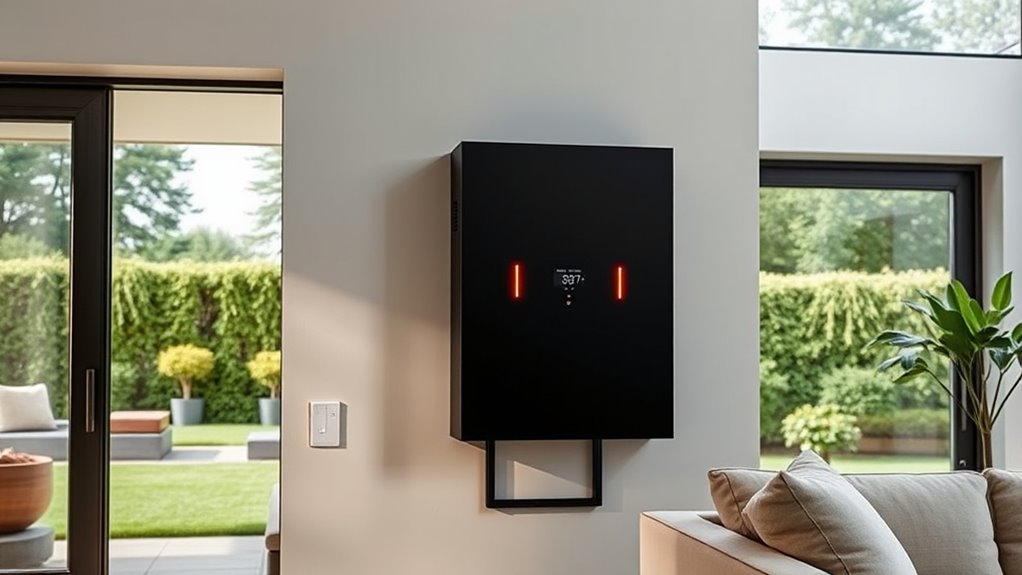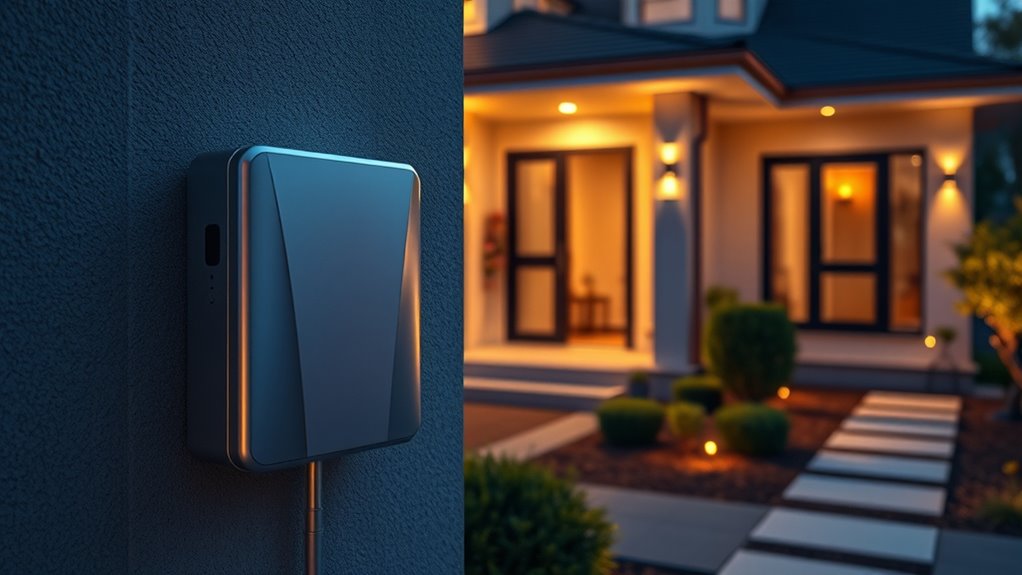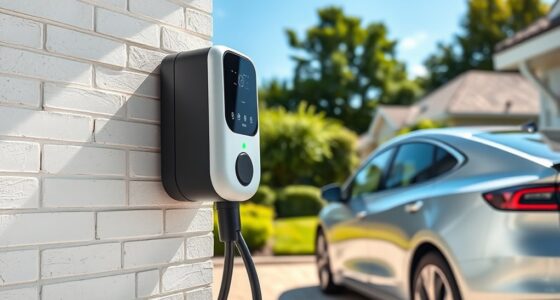Home battery backup systems can be a smart investment if you want reliable power during outages, save on energy costs, and reduce your environmental impact. They help you store excess solar energy, operate quietly, and cut reliance on the grid, while also offering long-term savings despite high upfront costs. The flexibility and eco-friendly features make them worth considering. Keep exploring to discover how these systems can fit your home and budget.
Key Takeaways
- They increase energy independence by storing solar energy and reducing reliance on the grid.
- Provide automatic, quiet backup power during outages, ensuring critical appliances stay operational.
- Can lower energy costs through off-peak charging and net metering benefits.
- Offer long-term savings despite high initial costs, with environmental advantages like emission-free operation.
- Their modular design allows for scalable capacity and seamless integration with existing solar systems.

Have you considered how a home battery backup system can enhance your energy independence? These systems serve as energy storage devices that capture electricity from your solar setup or the grid, giving you a reliable power source during outages without the noise, emissions, or fuel consumption associated with traditional generators. By integrating with your solar panels, they store surplus energy generated during sunny days, making it available at night or on cloudy days. This not only maximizes your renewable energy use but also reduces your dependence on the electric grid, increasing your overall energy self-reliance.
When the grid fails, a home battery backup kicks in instantly, providing uninterrupted power to critical appliances and circuits. This enhances your home’s resilience, especially during storms or emergencies. The seamless changeover is thanks to automatic transfer switches built into these systems, so you don’t have to manually switch power sources. Plus, because they operate quietly and emit no fumes, they’re much more environmentally friendly and less disruptive than gasoline or diesel generators. You won’t have to deal with noise pollution or fuel logistics, making them ideal for residential settings.
Another major benefit is the ability to optimize your energy costs. Many systems allow you to charge your batteries during off-peak hours when electricity prices are lower, then discharge during peak demand to save money. This time-of-use rate management can considerably reduce your monthly bills. If your utility offers net metering, you might also earn credits by selling excess stored energy back to the grid, further boosting your savings. Maintenance costs tend to be lower compared to traditional generators because batteries have fewer moving parts, though initial investments can be substantial depending on system size and complexity.
Popular options in 2025 include the Tesla Powerwall 3, with a 13.5 kWh capacity and real-time monitoring, and the LG Energy Solution RESU Prime, which offers up to 16 kWh in a compact design. The Generac PWRcell stands out with up to 18 kWh and modular capacity, while the Enphase IQ Battery provides flexible, microinverter-based storage from 3.5 kWh units. Uifne Battery offers customizable solutions tailored to your home’s specific energy profile, providing tailored flexibility.
Technical features like smart software enable real-time monitoring and load management, allowing you to optimize energy use efficiently. Modular designs mean you can add capacity as your needs grow, and many systems support whole-house backup or just critical circuits. Integration with various solar and inverter brands makes these systems versatile, fitting seamlessly into your existing home energy setup. Although the upfront cost can be high, long-term savings and environmental benefits make home battery backup systems a compelling choice for those seeking energy independence and resilience. Advanced battery technology continues to improve, making these systems more efficient and affordable over time.
Frequently Asked Questions
How Long Do Home Battery Backups Typically Last During an Outage?
You might wonder how long a home battery backup lasts during an outage. Typically, it depends on your battery’s capacity and your energy use. For example, a 40 kWh battery can power essential appliances for several hours with moderate use. If you’re running high-demand devices, it could drain faster—around 2 hours. To extend backup time, consider reducing energy consumption or adding more battery capacity.
What Are the Long-Term Cost Savings of Installing a Battery Backup?
You might worry about the cost, but installing a battery backup can save you $700 to $1,100 annually on energy bills. Over 10-15 years, that adds up to $7,000 to $16,500 in savings, especially if rates rise or net metering policies change. Plus, it provides reliable power during outages and helps you use solar energy more efficiently, making it a smart long-term investment.
Are Home Battery Systems Compatible With All Types of Solar Panels?
You might wonder if home battery systems work with all solar panels. Compatibility depends on factors like voltage, power output, and system design. Most hybrid inverters support various panel types, but you need to check if your panels meet the voltage and sizing requirements. While many panels can be integrated, retrofitting or specific system adjustments may be necessary to guarantee maximum performance and compatibility.
How Often Do Home Batteries Require Maintenance or Replacement?
Think of your home battery like a car; it needs regular check-ups to run smoothly. Most batteries last 5 to 15 years, with lithium-ion ones tending to go longer. You should test them every six months, clean terminals, and monitor voltage. Replacements are usually needed every 5 to 10 years, depending on usage and maintenance. Proper care extends their lifespan and keeps your backup system reliable.
What Incentives or Rebates Are Available for Installing Home Battery Backups?
You can take advantage of several incentives and rebates for installing home battery backups. The federal government offers a 30% tax credit, and many states provide rebates—like California’s SGIP or Connecticut’s programs. Some programs are limited or have specific eligibility criteria, so check your state’s offerings. These incentives can markedly lower your upfront costs, making your investment in battery backup systems more affordable and worthwhile.
Conclusion
So, are home battery backup systems worth it? If you value peace of mind during storms or power outages, they’re a smart choice—like having a trusty lantern in a blackout. While the initial cost might seem steep, the convenience and potential savings could make it worthwhile. Just imagine sitting cozy in your modern castle, knowing you’re prepared, even if a thunderstorm rumbles on outside. It’s a small investment for big peace of mind.









